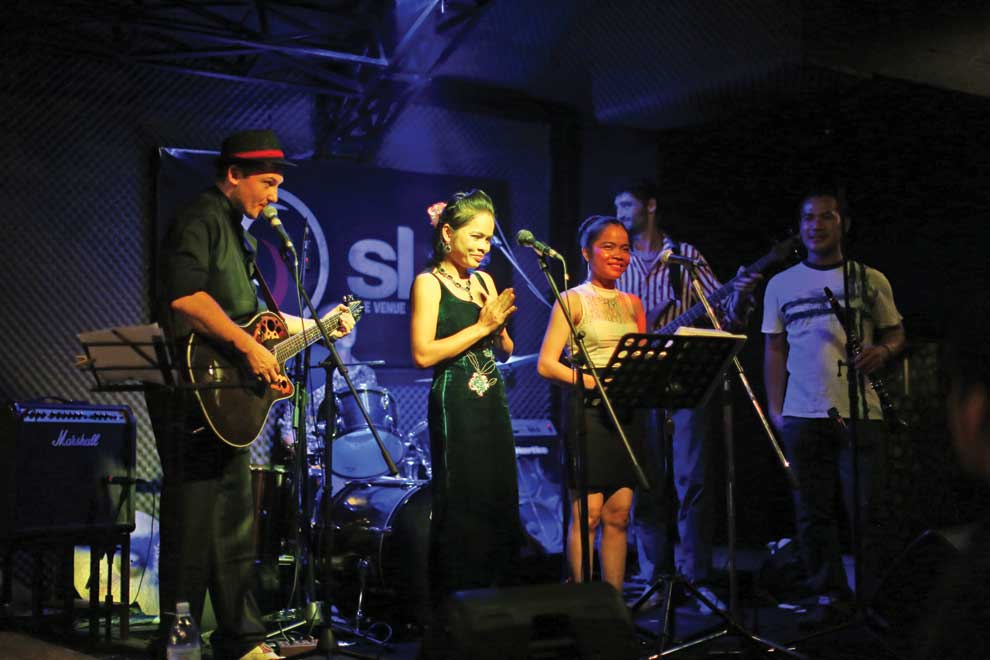
The Cambodian Space Project, seen here performing in March 2014, drew crowds to Equinox. Jeremie Montessuis/Film noir studio
Phnom Penh is a city on the rise. But a slew of recent live music venue closures has offered a timely insight into the dangers of boom and bust – and left gigging musicians worried about their prospects
Last Sunday afternoon, a gaggle of melancholy rockers gathered on the terrace of the Laneway Boutique Hotel. They sank beers, shared pleasantries with the stag do splashing about in the pool, and stared with sad eyes at the shuttered two-storey building directly across the road.

Equinox general manager Anthony Mrugacz. Eli Meixler
Equinox’s owner, Marco Salvetti, and general manager, Anthony Mrugacz, shook the hands of those who came to pay their respects at this self-styled “wake”, while also sniffing out potential buyers for the venue’s $4,000 speaker system, and new jobs for the dozen-odd staff left unemployed by the venue’s sudden closure. Recordings of rowdy Equinox gigs – the Mekong Pirates, Durian, The Underdogs – played in the background.
A sense of nostalgia germinated. As one ex-regular wrote in an email to Salvetti: “You created the only place in Phnom Penh where all types of people would come to hang out ... It was a special place and a special time.”
The announcement two weeks ago that the bar and gig venue was closing came as a shock to those who had come to see the two-storey building as something of a permanent institution on Street 278. When it first opened as a far smaller bar nine years ago, the Wat Langka area had only just been paved.
The news came on the heels of a long list of significant shutterings around the city. Just before Khmer New Year it was announced that Slur Bar wouldn’t be reopening following the holidays, leaving weeks of booked bands in the lurch. In January both The Groove and rock venue Oscars 51 shut up shop. Last year saw the closure of the longstanding Memphis Bar, and swing-central The Village closed for refurbishments and never reopened.
Options for gigging are now limited. Outside of Sharky Bar’s still active roster, performers must rely on the less than regular live music scheduling of venues such as Cabaret, Doors, Alley Bar and FCC’s The Mansion.
According to management, Equinox remained profitable up until closure and the decision to fold came in anticipation of a sharp hike in rent: a non-negotiable increase of over 300 per cent starting January 2016. “I have of course thought about it a lot, but it was the only logical thing to do,” said owner Salvetti – who also co-owns The Greenhouse in Kampot – speaking the day after the wake.
Mrugacz said that he was gloomy about prospects for the area. “It’s East Asians coming in with all this money,” he said, referring to the increased competition produced by mainly Chinese investors. “It’s infected the Khmer landlords.”

Businessmen have been seen touring Equinox’s closed premises, but nothing is known about the future of the space. Kimberley McCosker
He doesn’t know what will happen to the space now, but thinks it may be developed as a high-rise. He said he had seen East Asian businessmen touring the property, although he wasn’t sure where they were from. With a wry smile, Mrugacz suggested a rebrand for Street 278: no longer the celebrated “Golden Street” but rather “Pyrite Alley” – the proper name for the mineral more commonly known as fool’s gold.
But rent increases have not been the only factor in the implosion of Phnom Penh’s live music scene.
“We were expecting some venues to close,” revealed Joe Wrigley over coffee last week. As both a gigging musician and the compiler of the weekly Leng Pleng gig guide news-letter, Wrigley is a man well placed to analyse the bigger picture. He said that while Leng Pleng has still been listing around 50 one-off events per week, audience numbers were dwindling.
The explanation, he said, was simple: “Too many venues looking for a share of a small audience.”
Wrigley moved to Phnom Penh in 2013, choosing the town from a list of global possibilities because of its live music credentials. He saw that bands such as the bluegrass Grass Snake Union and punk rockers Psychotic Reactions were getting regular gigs, and decided that any town that could support such “esoteric stuff” must have a thriving local scene to boot. And for a while he was right.
“There were three or four venues opening around the same time, so it was a very good time to come and look for gigs,” he said. “I hit the ground running.”
But these “halcyon days” didn’t last. With a dozen venues around town, competition was fierce and resources scarce: bands started charging more, venues sunk money into sound systems and lighting to compete for audiences, and the money needed for advertising rose steadily. Hotels and hostess bars got in on the act, and started clamouring for access to the same small pool of musicians.

Crowds gather for Equinox’s fifth anniversary party in 2011. Nick Sells
Michael Hsu, owner of Sharky Bar, this week described 2010 to 2014 as the “golden era of live music” in Phnom Penh. But he said that even with a new band joining the circuit every few weeks, there still weren’t enough acts to satiate demand. And numbers quickly began dwindling. “I can’t even begin to tell you how many expat bands have formed, played and folded in the last four years,” he said, estimating that the pool of bookable bands had halved from about 30 to 15 between 2012 and today.
There is a belief, ironically, that the music scene was at its strongest when fuelled by amateur expats who played less frequently and so drew large crowds of friends and coworkers when they did. “There was energy at those shows,” Mrugacz said. He is disdainful of the changes that occurred when more venues opened up and some musicians started taking gigging more seriously. “If you get someone who is playing four times a week in four different bands, it’s about as exciting as doing laundry by hand,” he said.
Wrigley accepts that, although the current downturn in live music venues means that expats looking to make it as musicians in Phnom Penh should “forget it” for now, the closures are a necessary corrective.
But he is quick to point out that these current woes represent “just a fraction” of the city’s music scene.
“It’s misleading and very culturally biased to speak about music in Phnom Penh as just this couple of expat bars,” he said, pointing out that there is still a thriving demand for live music at venues targeting Cambodian revellers.
Julien Poulson, whose band The Cambodian Space Project were regulars on the Equinox stage, emphasised the same point in an interview last week. “The Cambodian music scene is exploding: on portable stages, from the back of trucks ... private parties are hiring bands all the time – they’re the biggest bookers.”
The lack of crossover between Cambodian and expat musicians is not something that any venue has successfully addressed. While Equinox occasionally hosted young Cambodian bands such as The Underdogs, Sliten6ix and Anti-fate, crowds remained expat dominated. Mrugacz put the blame on the acts themselves. “The Khmer bands were horrible at relating to the Westerners. They’re playing music influenced by the West but they stay in their little groups,” he said, adding that he removed tables from the upstairs area of Equinox in an attempt to force bands into socialising.

Joe Wrigley performing with his partner Mealea Lay as Miss Sarawan. Photo Supplied
For Cambodians, it’s not quite so simple. “[They are] Western run and the type of music is not the stuff [Cambodians] listen to,” said 22-year-old Vanntin Hoerun, frontman of Sliten6ix, when asked to comment on why venues like Equinox had failed to draw in a young, local crowd. He pointed to Show Box as the venue that best succeeded in creating a non-intimidating atmosphere for locals to mix with expat musicians and audiences. Due to noise complaints, Show Box can no longer host regular gigs.
Joe Wrigley argues that regardless of how accommodating venues might be, revitalising the live gig scene by courting Cambodian audiences will not be an easy task. He believes there is a distinct difference in the way that Cambodians and expat audiences consume music, with the former considering bands primarily as background entertainment.
“In Cambodia, musicians have quite a low status. [Cambodians] will expect musicians to serve them in the same way they might expect waiters to fill their glass with beer,” he said. Wrigley, who performs with his Cambodian partner under the moniker Miss Sarawan in both expat- and Cambodian-oriented venues, recalled a particularly surreal performance in a casino earlier this month where “we might as well have been on TV”.
Mrugacz is equally sceptical that the divide will be bridged any time soon. “We failed in crossing over because the expat community had too many options,” he said.
Mrugacz predicts that after the closure of Equinox, the live music scene in Phnom Penh will become increasingly sanitised as the capital succumbs to the lure of East Asian money.
The hope, he said, was that eventually this drought might eventually spark some positive change. “When things start to get bad again in Phnom Penh, what’s that going to cause? People speaking out again. And how do people speak out? Through music,” he said.
“When they do, I’ll bring Equinox back.”
Contact PhnomPenh Post for full article
Post Media Co LtdThe Elements Condominium, Level 7
Hun Sen Boulevard
Phum Tuol Roka III
Sangkat Chak Angre Krom, Khan Meanchey
12353 Phnom Penh
Cambodia
Telegram: 092 555 741
Email: [email protected]





